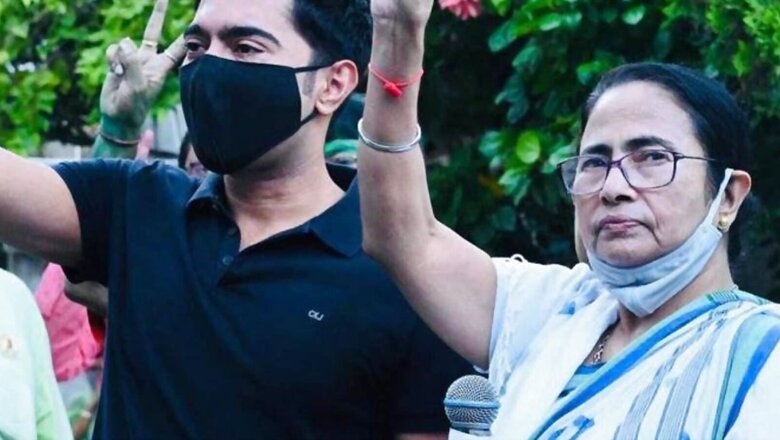
views
Abhishek Banerjee, Trinamool Congress’s Lok Sabha lawmaker from Diamond Harbour and nephew of West Bengal chief minister Mamata Banerjee, has rejected reports of a rift between him and the party supremo. Speaking exclusively to News18 on Tuesday, he tried to pierce the “gas balloon” of rumours and said Mamata Banerjee is his leader and guiding light.
The buzz of discord between the two top leaders of the TMC became resonant, when Mamata in a recent emergency meeting dissolved all national posts, including that of the party national general secretary that was held by Abhishek, and formed a 20-member working committee.
“Mamata Banerjee is my leader. She has fought many battles with her head held high. And looking at her, I have not only gathered strength and inspiration but also understood that nothing is more important than fighting for our people. Nothing is more important than serving our people. Our Hon’ble Chairperson is our guiding light. She is the person who taught us to fight against all divisive forces. She is the person who gave us the courage to fight against all adversities with our heads held high,” Abhishek told News18.
Abhishek stated that he is one of the soldiers in Mamata Banerjee‘s team and he will work according to the directions of the party chairperson.
One section of party insiders says that there are no differences between Mamata Banerjee and Abhishek Banerjee; he has a divergence of views with some senior leaders in the party.
Then what prompted senior leader and MP Kalyan Bandyopadhyay to openly criticise Abhishek and even challenge his leadership? What led to the confusion over the TMC candidate lists for the upcoming municipality elections across West Bengal? Why did senior leaders and party office bearers like Partha Chattopadhyay and Subrata Bakshi express annoyance over a purported “fake list” that was uploaded on the party website and social media handles?
Abhishek started his TMC national general secretary journey by reaching out to all the seniors. He personally met them and took their blessings.
So what happened after that?
Insiders say it was the manifestation of a complex, triangular, inner-party friction, the seeds of which were sown back in 2019, just after the party’s poor performance in the general elections.
The BJP bagged a whopping 18 of the 42 Lok Sabha seats in West Bengal— up from two in the 2014 polls. A section of political watchers started comparing the situation with the 2009 general elections when the Trinamool Congress made its presence felt when it and other UPA allies won 26 seats (up from 1 in the previous election) and then in 2011 ended the Left’s 34-year rule in the state.
Sensing a possible win in the land of Syama Prasad Mukherjee, the BJP top leadership turned its focus on West Bengal.
It was then that Trinamool Congress chief Mamata Banerjee asked party leaders to pull up their socks and jump into action. Abhishek too started the long haul as a loyal team member.
Political strategist Prashant Kishor stepped into the picture and his organisation Indian Political Action Committee (I-PAC) was pressed into service. A structured, data-oriented, ground reality-based strategy was chalked out under the leadership of Mamata Banerjee for the 2021 West Bengal assembly elections.
An approach of decentralisation of party affairs and empowering local leaders was adopted. This plan is believed to have irked a section of old-timers and prompted a sense of dejection.
The experiment led to a situation where leaders like Suvendu Adhikari left the TMC ship and switched to the BJP.
However, this approach was not challenged across the board as the party was about to face a tough election.
Political analysts say the micromanagement strategy was one of the reasons behind Trinamool’s thumping victory in the 2021 assembly elections.
Obviously, the outcome strengthened Abhishek’s position in the party and he was made the all India general secretary. But the change led to some senior leaders feeling dejected and insecure.
The recent confusion and apparent rift are believed to be a result of that complex, triangular, inner-party friction.
The decentralisation of the party and empowering ground workers under Mamata Banerjee’s leadership gave results. And then the “one person, one post” policy was proposed by Abhishek, say party sources.
It was considered that Suvendu Adhikari was able to pressurise the party when he was part of the Trinamool because he had more than four ministries under him and had immense organisational power.
The decentralisation of power was also the mantra through which the burden on any particular leader would reduce, Abhishek thought, say party sources.
When the policy was adopted, it was clearly stated that this was not applicable to the chairperson of the party and she could make changes to the rule.
This led to dissent among a section of seniors as immediately some of them had lost their posts of district president.
The divide grew deeper and then this section of seniors started to make their displeasure known.
Mamata Banerjee has now formed a working committee and adopted an inclusive approach, insiders say. All is quiet in the TMC, for now.
Read all the Latest Politics News here


















Comments
0 comment